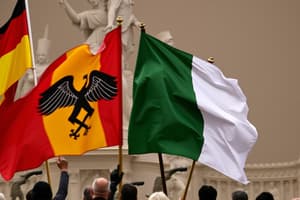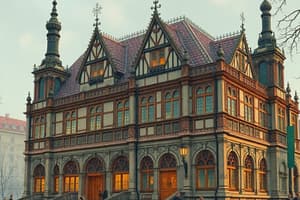Podcast
Questions and Answers
Prussia's military power and growing influence threatened the traditional power of Austria, France, and Russia.
Prussia's military power and growing influence threatened the traditional power of Austria, France, and Russia.
True (A)
The German Empire was formed in the city of Frankfurt.
The German Empire was formed in the city of Frankfurt.
False (B)
Otto von Bismarck is often referred to as the 'Iron Chancellor'.
Otto von Bismarck is often referred to as the 'Iron Chancellor'.
True (A)
The unification of Germany under Prussian leadership did not significantly impact the European balance of power.
The unification of Germany under Prussian leadership did not significantly impact the European balance of power.
Bismarck's diplomatic maneuvering contributed significantly to the formation of the German Empire.
Bismarck's diplomatic maneuvering contributed significantly to the formation of the German Empire.
Flashcards are hidden until you start studying
Study Notes
German Unification: From Prussian Dominance to a Changing Europe
In the mid-19th century, Germany was not a unified nation but rather a complex network of small principalities and states. The process that led to the eventual unification in 1871 was a journey marked by political maneuvering, military prowess, and the transformation of the European balance of power. This article will delve into the subtopics of Prussian dominance, the formation of the German Empire, the impact on the European balance of power, and the role of Otto von Bismarck, who played a pivotal role in fostering this transformation.
Prussian Dominance
Prussia, a German state known for its military strength and political ambition, was a central figure in the unification of Germany. Its ruling elite, led by the House of Hohenzollern, sought to build a powerful state that could rival Austria and other neighboring powers. Prussia's success in the 1866 Austro-Prussian War, which saw Prussia defeating Austria and other German states, laid the groundwork for its eventual dominance over the German confederation.
Formation of the German Empire
In the aftermath of the Austro-Prussian War, Prussia had gained significant territories and influence. In 1870, France, seeking to regain territories lost to Prussia in the war, declared war. This led to the Franco-Prussian War, which ultimately resulted in another victory for Prussia. A peace conference convened in the German city of Versailles, where the German princes and representatives of the South German states proceeded to form the German Empire, with King Wilhelm I of Prussia as the first German Emperor, crowned as Wilhelm I of Germany.
Impact on European Balance of Power
The unification of Germany, under Prussian leadership, fundamentally altered the European balance of power. Prussia's military power and its growing influence on the continent threatened to offset the traditional power of Austria and Russia. The new German Empire, with its vast territories and large population, would emerge as a major player in European politics.
Otto von Bismarck
The man largely responsible for the unification of Germany was Otto von Bismarck, often referred to as the "Iron Chancellor." Bismarck, a brilliant politician and diplomat, used his pragmatic approach to foreign and domestic policy to steer Germany's course to unification. Through clever diplomatic maneuvering and skillful exploitation of the political landscape, Bismarck was able to foster the conditions that would lead to the formation of the German Empire.
Conclusion
The unification of Germany, achieved through the efforts of Prussia and Otto von Bismarck, marked a significant milestone in European history. The new German Empire, with its powerful military and burgeoning industrial might, would challenge the traditional balance of power on the continent. This unification would also set the stage for future conflicts and the eventual rise of Germany as a global power. The road to German unification was paved with military victories, political skill, and the exploitation of the complex web of relationships that existed among European powers at the time.
Studying That Suits You
Use AI to generate personalized quizzes and flashcards to suit your learning preferences.




